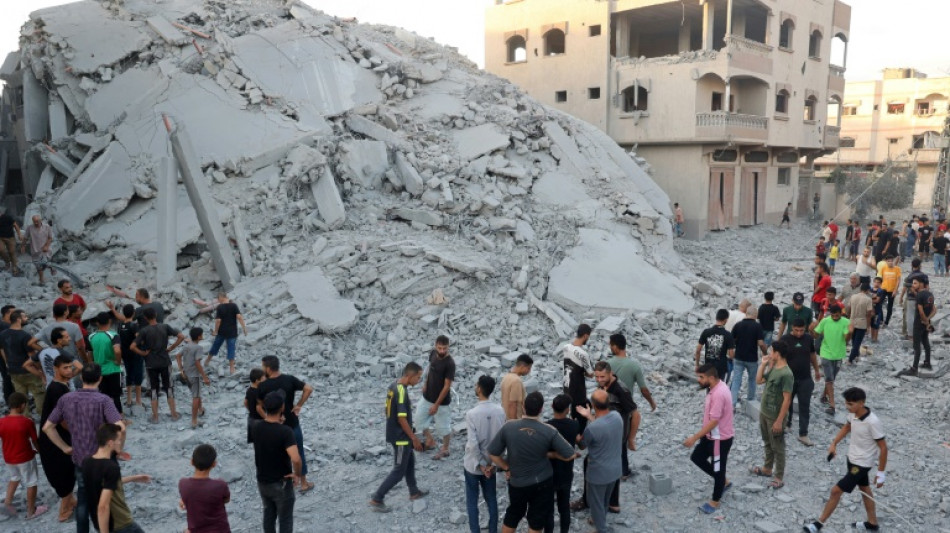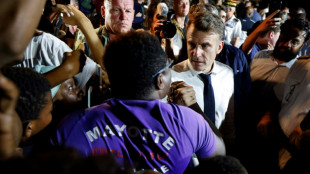

Israelis in Cairo for Gaza talks but disputes linger
Israeli negotiators were in Cairo Friday for talks on a Gaza truce, a spokesman said, but a dispute over the presence of Israeli troops on Gaza's southern border remained among sticking points.
Mossad spy agency chief David Barnea and Ronen Bar, head of the Shin Bet domestic security service, were in the Egyptian capital and "negotiating to advance a hostage (release) agreement", Prime Minister Benjamin Netanyahu's spokesman Omer Dostri told AFP late on Thursday.
Egypt with fellow mediators Qatar and the United States are trying to reach a deal that would end more than 10 months of war between Israel and the Palestinian Islamist movement Hamas in Gaza.
Top US diplomat Antony Blinken visited the region this week to emphasise that time is running out for a deal which "needs to get done in the days ahead".
Witnesses on Friday reported combat in the territory's north, heavy shelling in the centre, and tank fire in the far south near Rafah city.
The United Nations said tens of thousands of civilians have been on the move again this week from Deir el-Balah and the southern city of Khan Yunis after Israeli military evacuation orders, which precede military operations.
The war has displaced about 90 percent of Gaza's population, often multiple times, leaving them deprived of shelter, clean water and other essentials as disease spreads, the UN says.
- 'No way to live' -
"Civilians are exhausted and terrified, running from one destroyed place to another, with no end in sight," Muhannad Hadi, the UN humanitarian coordinator for the Palestinian territories, said late Thursday.
"This cannot continue," he said.
Israel's military on Friday said that over the past day troops had "eliminated dozens" of militants around Khan Yunis and Deir el-Balah, in central Gaza.
In April the military had pulled troops out of Khan Yunis after months of devastating fighting, yet has found itself having to resume operations there, leaving civilians feeling they have nowhere to turn.
"Every time we arrive somewhere, we get a new evacuation order two days later. This is no way to live," said Haitham Abdelaal.
Hamas's unprecedented October 7 attack on southern Israel triggered the war and resulted in the deaths of 1,199 people, most of them civilians, according to an AFP tally based on Israeli official figures.
Israel's retaliatory military campaign has killed 40,265 Palestinians in Gaza, according to the Hamas-run territory's health ministry, which does not give details of civilian and militant deaths. The UN rights office says most dead are women and children.
Palestinian militants also seized 251 hostages, of whom 105 remain in Gaza including 34 the military says are dead.
The Israeli military recovered the remains of six hostages from a tunnel in the Khan Yunis area this week, and on Thursday said bullets had been found in their bodies.
The bullets indicated they had been shot. An investigation continues into the circumstances of their deaths, a military spokesman said.
- 'Now is the time' -
Diplomatic efforts have intensified to reach a Gaza truce and avert a wider war following the killings of two senior Iran-backed militants that sparked threats of reprisals from Tehran and its allies, who blamed Israel.
Accepting her Democratic party's presidential nomination in Chicago, US Vice President Kamala Harris said "now is the time to get a hostage deal and a ceasefire deal done".
The basis of talks has been a framework which US President Joe Biden outlined in late May, and which he described as an Israeli proposal.
The three-phase plan would initially see hostages exchanged for Palestinians in Israeli jails during what Biden called a "full and complete ceasefire" lasting six weeks.
Israeli forces would withdraw from "all populated areas of Gaza", under the plan.
During his regional tour, Blinken said Netanyahu had accepted a US "bridging proposal" for a truce that "is very clear on the schedule and the locations" of the Israeli withdrawal.
Israeli newspaper Yediot Aharonot, however, reported that "the Americans understood the mistake" Blinken had made in his remarks about Netanyahu accepting the proposal.
The office of Netanyahu, whose hard-right coalition relies on the support of members opposed to a truce, rejected as "incorrect" media reports that "Netanyahu has agreed that Israel will withdraw" from the Philadelphi corridor.
The prime minister sees control of the corridor along the Egyptian border as necessary to prevent Hamas rearming.
Hamas has said it supports the plan Biden initially outlined. But it also said the US bridging proposal "responds to Netanyahu's conditions" and accused him of "obstructing an agreement".
- Red Sea rescue -
In its statement, Hamas cited Netanyahu's "insistence on continuing to occupy" the Philadelphi corridor as well as two other locations.
Lebanon's Hezbollah movement and Israeli forces have exchanged near-daily fire over their border, and Huthi rebels in Yemen have made dozens of missile and drone strikes against shipping in surrounding waters vital to world trade.
The Philippines on Friday urged its mariners to avoid the Red Sea, after sailors from a European Union naval mission rescued the largely Filipino crew of an oil tanker attacked by Huthis in the Red Sea.
US forces destroyed two Huthi drones over the Red Sea and another drone in a rebel-held area of Yemen, Central Command said on Thursday.
burs-it/dv
G.Loibl--MP




